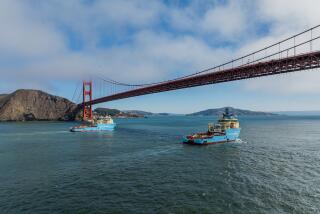Exxon Says It Will Pursue Cleanup If Coast Guard Insists
- Share via
WASHINGTON — The Exxon Corp. promised today to pursue the cleanup of oil-contaminated beaches in Alaska into 1990 if directed by the U.S. Coast Guard, saying it will go along with any “reasonable request.”
W. D. Stevens, president of Exxon Co. USA, told a House subcommittee the oil company stands behind earlier pledges to return to the contaminated shoreline next spring “to reinspect the area to assure the job has been properly done, and if not, to put it right.”
Stevens said “we intend to more than achieve” cleanup objectives by mid-September and the company intends to go ahead with plans to demobilize most of its operation then for the winter.
Coast Guard Vice Adm. Clyde Lusk said the contaminated areas will be surveyed in the spring and if additional work needs to be conducted Exxon will be told to resume cleanup efforts. But Lusk suggested if Exxon disagrees, the government’s only option is to federalize the effort and assume responsibility.
Lusk said he has “no doubt” that during the spring survey there will be “disagreements on what should be done.”
When pressed by Rep. George Miller (D-Martinez) on what Exxon would do if the Coast Guard demanded additional cleanup actions, Stevens stopped short of committing the company to complying with any Coast Guard directive.
“We will follow through on any reasonable request that is made,” said the Exxon executive. He said he could not make “an unequivocal commitment” and told the hearing he “would be naive to do that” in light of expected disagreements within the scientific community on what should constitute a clean shoreline.
Concerns Arise
Concern about Exxon’s cleanup plans arose this week after disclosure of an internal company memorandum that implied Exxon will not commit itself to further cleanup efforts next spring. The memo said current activity to clean oil from an estimated 700 miles of shoreline along southern Alaska resulting from the Exxon Valdez spill will stop Sept. 15 because of oncoming cold weather.
Stevens said the wording of the memo “was unfortunate” and under questioning from Miller, the subcommittee chairman, said it was not meant to suggest Exxon was pulling out of the cleanup effort after September.
Miller said the focus of the hearing before the House Interior subcommittee on water power and offshore energy resources was amined at determining Exxon’s future cleanup plans and what actions the U.S. Coast Guard intends to take should Exxon not pursue a cleanup.
In separate testimony, Dennis Kelso, Alaska’s commissioner of environmental conservation, criticized Exxon’s decision to pull its heavy equipment back to Anchorage for the winter, saying there would be no way to launch emergency response efforts should new oil slicks threaten key fishing areas.
“Anchorage by road is about six hours from Valdez across two mountain ranges,” said Kelso.
Has Overall Authority
The Coast Guard has overall federal authority over the cleanup effort and subcommittee members are looking for an assurance that it will force Exxon to pursue the cleanup into 1990 if necessary.
Most environmentalists believe the cleanup will be far from completed by mid-September, although Exxon officials have said they expect to “stabilize” the contaminated areas by that time.
More to Read
Sign up for Essential California
The most important California stories and recommendations in your inbox every morning.
You may occasionally receive promotional content from the Los Angeles Times.













